[SAFE]
 Wednesday, July 29, 2015 at 10:00PM
Wednesday, July 29, 2015 at 10:00PM [SAFE]
Written and directed by Todd Haynes. Cinematography by Alex Nepomniaschy.
With Julianne Moore, Xander Berkeley, James LeGros, Beth Grant and Peter Friedman.
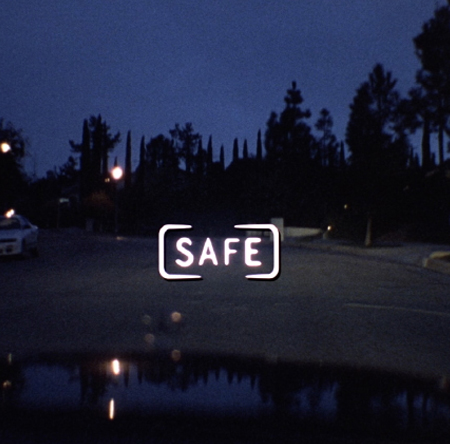 Hit Me With Your Best Shot has been running for six years and we've finally braved one of the most fascinating jewels of the 1990s cinema. Todd Haynes's disturbing, sad, confounding, and highly interpretable early masterwork [SAFE]. It's the film that layed the groundwork for the cult of Julianne Moore (on the heels of her well regarded but little-seen performance in Vanya on 42nd Street). Two years later mainstream stardom with frequent eyes on the art house, hit. In 1997, a seismic year, she had her first major role in a blockbuster (Lost World: Jurassic Park), her first instant classic with accompanying Oscar nod (Boogie Nights), and fell in love with her eventual second husband, then freshmen director Bart Freundlich (Myth of Fingerprints). And by then people were starting to discover [SAFE], too. The film's reputation is such now that people forget that not many people knew about it back then. It grossed just $500,000 in theaters and mystified many critics.
Hit Me With Your Best Shot has been running for six years and we've finally braved one of the most fascinating jewels of the 1990s cinema. Todd Haynes's disturbing, sad, confounding, and highly interpretable early masterwork [SAFE]. It's the film that layed the groundwork for the cult of Julianne Moore (on the heels of her well regarded but little-seen performance in Vanya on 42nd Street). Two years later mainstream stardom with frequent eyes on the art house, hit. In 1997, a seismic year, she had her first major role in a blockbuster (Lost World: Jurassic Park), her first instant classic with accompanying Oscar nod (Boogie Nights), and fell in love with her eventual second husband, then freshmen director Bart Freundlich (Myth of Fingerprints). And by then people were starting to discover [SAFE], too. The film's reputation is such now that people forget that not many people knew about it back then. It grossed just $500,000 in theaters and mystified many critics.
I've never forgotten this line from a Damian Cannon review back in the day
The acting is amazingly flat and inexpressive, the result of a performance by Moore which is either fantastic or abysmal. "
More after the jump including the Best Shot Choices
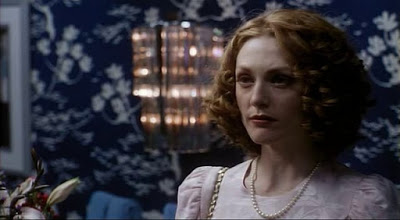
She's fantastic, but his 'either/or' scenario is understandable. Carol is flat and inexpressive. She speaks in a high pitched unsure of herself register. She doesn't really finish her thoughts let alone articulate them well. She drives to the emptiest part of an empy parking lot during a coughing jag so as not to disturb any of the nonexistent people. She's a complete cypher which is always why her famous self-affirmation startles and disturbs and feels arguably like satire at film's end.
This is surely part of her sickness, this lack of self. Her perverse lack of relationship to herself makes her every mirror scene, a Julianne Moore specialty, all the more momentous. What is Carol seeing when she looks at herself? Is it the same thing we're seeing when we watch the film?
I first saw [Safe] in college with my closest friends. Though the movie was hard to penetrate on a single viewing, it proved as impossible to shake as Carol White's illness. We referenced it frequently over the years and it came to be haunted shorthand for a lot of different types of concerns and conversations: mental health issues, psychosomatic illness, cultish manipulation, "fad" allergies, actual disease, and all manner of internalized emotional blockage. Then two weeks ago one of the friends I first saw it with lost his sister-in-law to suicide. We were aware that she'd been very ill but the more the story came to light -- her inability to be around any kind of screen (phones/tv), fears of "mold allergies" (though she lived in a dry climate), general fatigue, and degenerating health weakness and isolation -- the more we all whispered "Safe" with awful reverence and grief to each other. (As a result I couldn't go near it this week, not in the way the series generally requires, but having seen it multiple times I still chose a shot.)
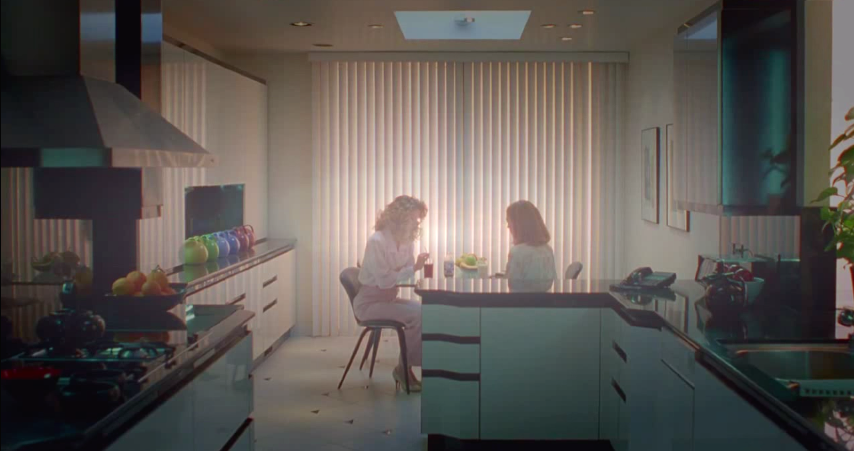 Carol is often posed in front of curtained off light, as if she's the obstacle to perfect pictures rather than the subject
Carol is often posed in front of curtained off light, as if she's the obstacle to perfect pictures rather than the subject
That's the highly effective stealth power of this Todd Haynes film. As with Carol White's mysterious coughs and fatigue, it builds so gradually but so persuasively that by the time she is really sick, you're completely unsure of how to feel about her or her condition but you're definitely feeling. Is it real? Imagined? Is it mental illness cloaked with physical systems? Is Carol's complete lack of self-knowledge actually exacerbating the condition or causing it or both?
Though it's no surprise that the film stuck with us, even haunted us, it was also no surprise that the film took years to build its critical reputation. Haynes's direction is utterly precise throughout but it's not inviting, forever keeping you at a distance. You can practically play "Where's Carol?" in the early scenes, she's such a non-presence in the consciously art-directed tableaus.
Indeed the ratio of longshots to closeups is so unlike 99.9 percent of modern American films that it plays like calculating even cruel observation. The camera itself becomes a collaborator in Carol's condition. She dwindles as the film goes (Julianne Moore lost a lot of weight for the final scenes) but the compositions were already treating her like an insignificant fragile blur in otherwise immaculate (and sterile) dioramas as if the entire world were "staged" for an Open House for a home that no one has ever lived in.
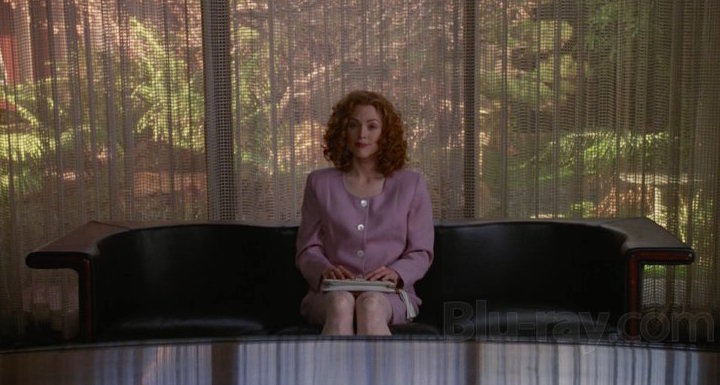 best shot
best shot
Further damning evidence of the camera's toxicity... it always pushes in on Carol when she's at her most vulnerable, usually during her episodes... but sometimes triggering them. One of my favorite scenes, directly before the long sustained brilliant scene when Carol freaks out at a baby shower, finds her uncomfortable in a psychiatrist office. Her head keeps tilting like a deer trying to make out something in the forest. She's in a fog when it comes to his pointedly obvious request:
We really need to be hearing from you. What's going on in you?"
What's going in you. The 'in' being telling.
She's framed against curtains again, but the lighting is unusually dark this time as befits the situation and, let's just say it, Carol's own dimness. Behind the curtains this time is an atypically messy tableau of wildlife. It would be insane to suggest that Carol would be instantly healed were she to throw open curtains and windows and get out of her oppressively controlled designed environments, rather than perpetually trading in one for another each time (even once she's outdoors), but she desperately needs to let the light in and really see.

10 MORE BEST SHOTS FROM OUR INFORMAL CLUB...
Click on the images for the accompanying articles
Movie Motorbreath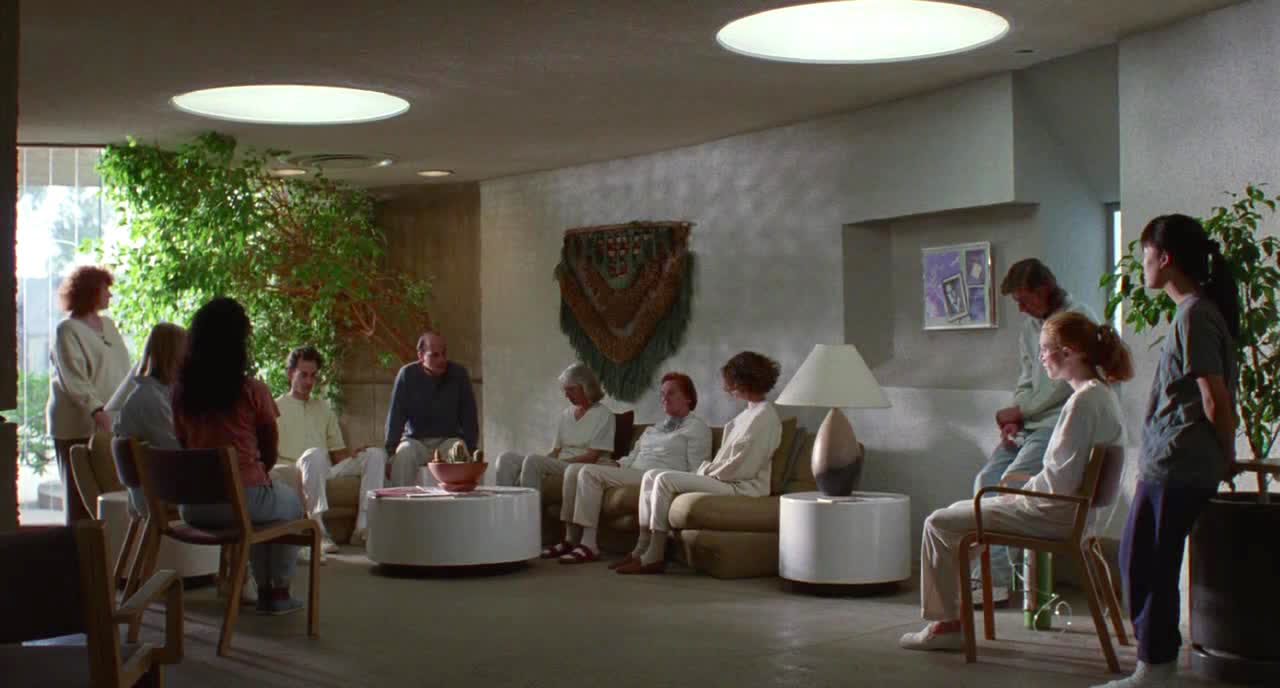 Antagony & Ecstasy
Antagony & Ecstasy 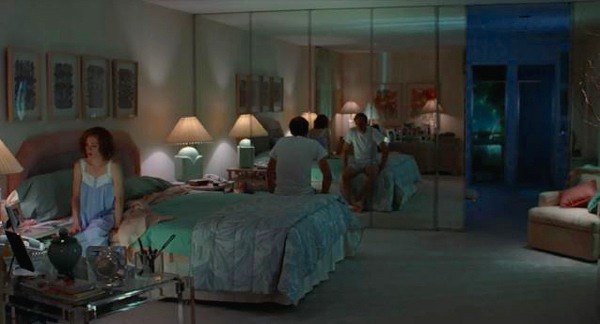 Sorta That Guy
Sorta That GuyDefiant Success
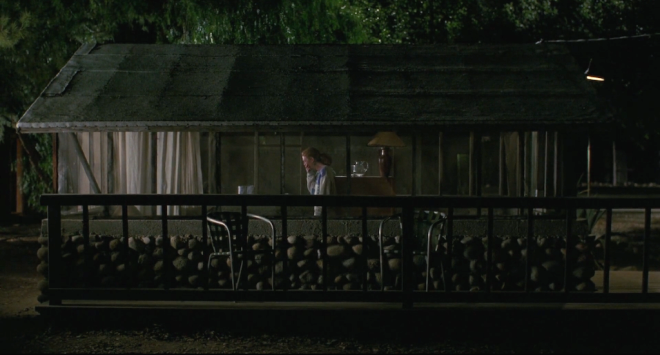 Coco Hits NY
Coco Hits NY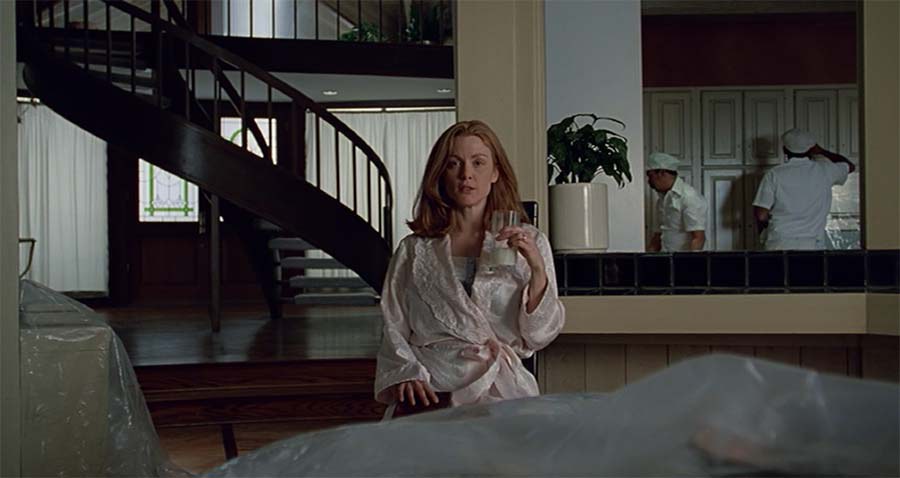 54 Disney
54 DisneyChirapat
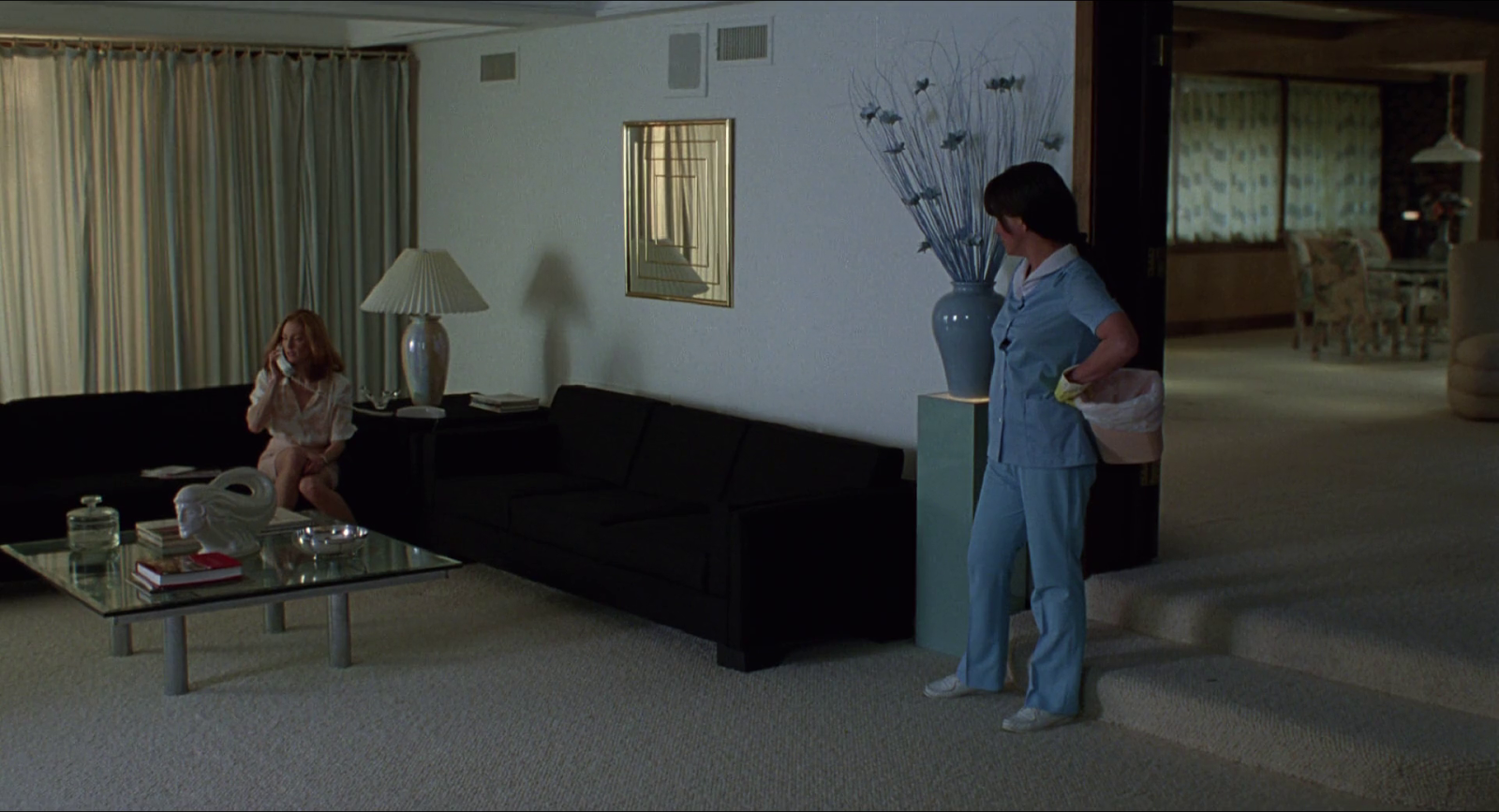 Magnificent Obsession *NEW PLAYER*
Magnificent Obsession *NEW PLAYER*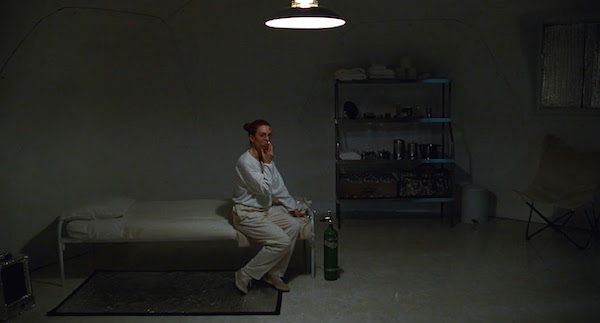 Film Actually
Film Actually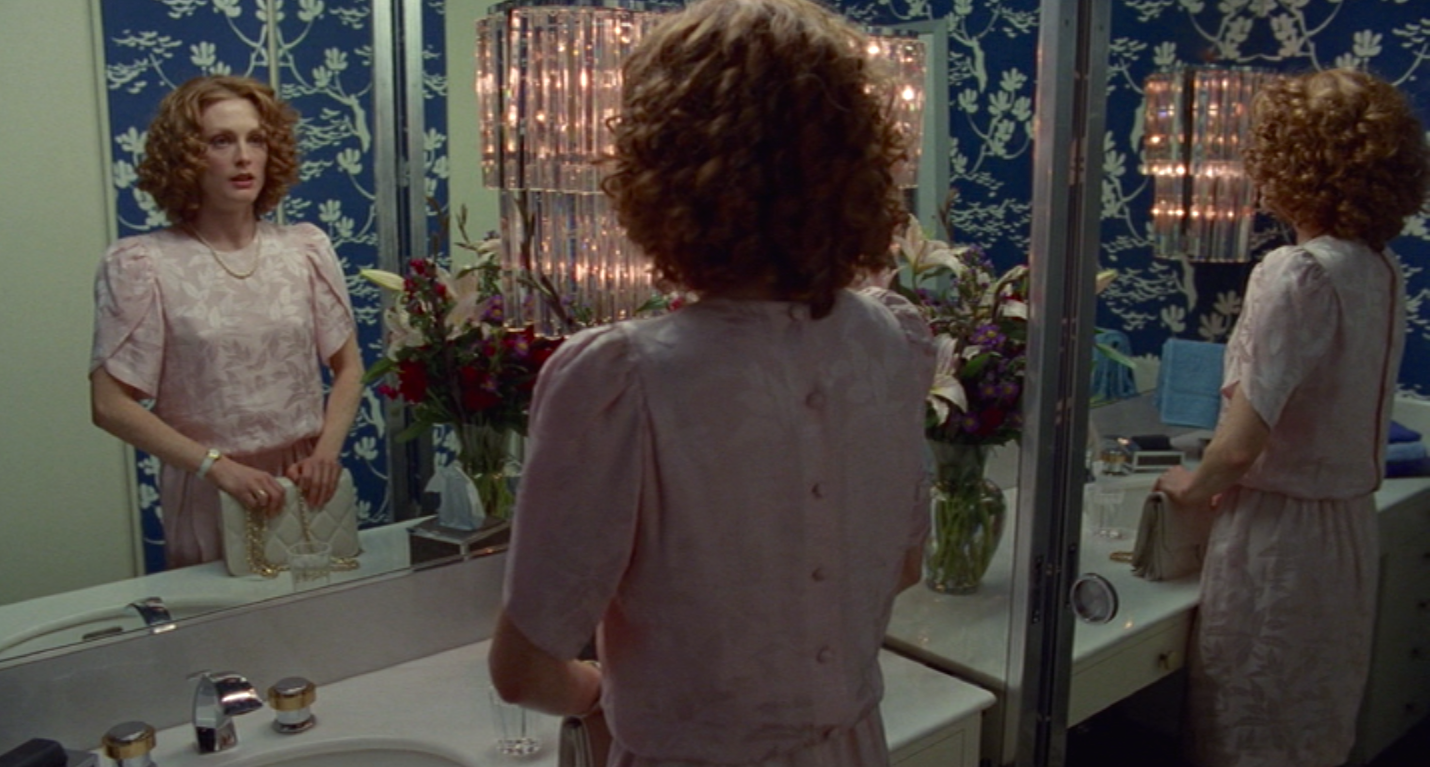 The Entertainment Junkie
The Entertainment Junkie



Reader Comments (14)
I've loved this series since its start. Here's my first entry, I simply couldn't resist choosing a shot from one of my favorite films.
http://magnificaobsessao.blogspot.pt/2015/07/hit-me-with-your-best-shot-safe-1995.html
WELCOME. love to get new voices.
So... not to jinx it or anything, but it's cool we all picked different shots. A fitting tribute to this movie.
This movie is incredible. Amongst my top five of the decade.
I thought everyone would pick the milk shot. Shows how many good ones there were. A strange but intriguing film
Surprised no one picked the night garden shot with the overexposed light.
Fantastic choice for Hit Me btw!
I just saw "Safe" again a couple of months ago, and it's still eerie after all these years. "Safe" feels a bit like "Invasion of the Body Snatchers," with Moore as a sympathetic pod person.
Speaking of toxic households, I got a jolt when I realized Carol's husband was the actor who played the screwed over adult Christopher Crawford in "Mommie Dearest"!
These are such wonderfully insightful posts!
This is one of my all-time favorite movies. I'm so glad Criterion released it early this year. I don't think I discovered it until the early 2000s or so. All of these shots are beautiful - they look like no other film.
Cameron -- agreed. I learn so much every episode of this series, i swear.
Rick Gould -- RIGHT? when I was watching Moommie Dearest earlier this year I was like... BUT THAT'S... BUT THAT'S... MR. WHITE.
I've never realized that she parked her car so far away because of her .. politeness. That's so very true to her character. Very insightful.
The other shot that I like is the one where the guy in white protection suit walking in the distance. It's like I'm transported to a weird sci-fi movie for a moment. It's intriguing.
Great work all. Wish I could've joined in this round.
Thank you so much for covering [safe] - my favourite film of all time, it changed the way I thought about cinema. I've been reading TFE for years and have often intended and failed to participate in Best Shot and I think I'm just gonna have to accept that if I didn't join in for [safe] it's probably never going to happen! Luckily for me, you and your fellow contributors give such insightful and thoughtful readings that I wouldn't know what to add to the commentary anyway!
One of the best horror movies I've ever seen. The best horror films are genre nonconforming. I feel like the Julianne Moore character from [safe], where my verbal and written communication is not enough for others to comprehend me.